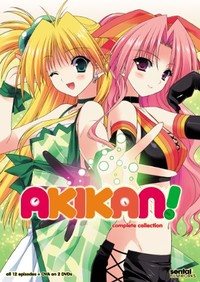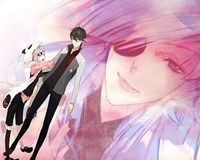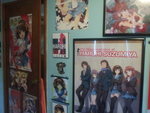Shelf Life
Hikari Un-Go
by Erin Finnegan,

None this week
Rental Shelf
Akikan! collection DVD
Perishable
Princess Resurrection complete collection DVD
Stream Worthy
Un-Go ep. 1-11
 Based on a pun meaning “empty can,” Akikan! is about Kakeru Daichi, a soda enthusiast (not an otaku) who one day purchases a can of melon soda only to have it come to life in the form of a magic(-ish) girl who starts living in his apartment. Kakeru names the girl “Melon” and the plot proceeds along through more-or-less standard tropes. New Akikan! girls are introduced in following episodes, Melon starts attending Kakeru's school, and there's a love triangle between Melon and Kakeru's childhood friend (shockingly, a human).
Based on a pun meaning “empty can,” Akikan! is about Kakeru Daichi, a soda enthusiast (not an otaku) who one day purchases a can of melon soda only to have it come to life in the form of a magic(-ish) girl who starts living in his apartment. Kakeru names the girl “Melon” and the plot proceeds along through more-or-less standard tropes. New Akikan! girls are introduced in following episodes, Melon starts attending Kakeru's school, and there's a love triangle between Melon and Kakeru's childhood friend (shockingly, a human).Normally I'm not fond of ero-com shows that follow precise guidelines, but Akikan! didn't drive me up a wall like others. I was surprised to be entertained on a couple of fronts; foremost that Kakeru isn't a wimpy blank slate like most harem comedy protagonists. Unlike the usual passive accidental perverts, Kakeru revels in his perversity and tells bawdy jokes that get him zapped by Melon. In that respect, Kakeru is much a bit like Ataru from Urusei Yatsura. Kakeru even takes action to advance the plot! He insists Melon attend his school, because he doesn't want her just sitting around his apartment watching baseball all day. In an added touch of realism, Kakeru even has to bribe Melon's way in. (What is it with parentless transfer students entering school with no administrative hurdles? Do Japanese high schools just enroll anyone off of the street?!) .
Second, I like the way the show handles Budoko, a purple-clad elementary school-aged girl who was originally grape soda. She isn't in love with Kakeru, per se, and she doesn't wind up living at his house. Instead, she spies on the other characters as a weak and comic villain no one takes seriously. I was relieved that, for once, this type of character wasn't intended as a sex object.
In general, Akikan! fails in the titillation department. Strangely, it has a battling girl plot similar to Sekirei; the Akikan! girls were created to battle to the death to determine whether aluminum or steel cans are superior. Unfortunately, perhaps, Akikan! appears to have about 1/4th of the budget of Sekirei. The animation quality suffers and the character designs border on terrible. Poor Melon's hair is so pointy and crappy looking that it actually distracts from the action.
The low production values are reflected in this bare-bones DVD release, with kind of a bootleg-looking DVD jacket, ugly menus, no dub, and no extras. The DVD menu is so blasé it actually lowered my expectations for the show itself, allowing me to feel pleasantly surprised every time I chuckled. If that was the designer's intend, I say, “well played, sir! Well played.”
Also well played: in one dramatic scene, Kakeru falls to his knees in the rain and screams “noooooo!” over an empty soda can. It's a serious moment in a higher budget episode half-way through, but I had to laugh. After all, that crane-pulling-away-shot is a cheesy classic nowadays.
Saying that I was surprised that I didn't hate this low-budget show is hardly a heartfelt endorsement, but if you go into Akikan! with lowered expectations, it's not so bad. Likewise, if you bought it at an extreme discount (think dollar bin), it wouldn't be such a terrible purchase.
Let us say, in a crude extended metaphor, that you're in a bar, it's closing time, and there are two unattached people left that you could potentially take home. I think Akikan! is the less attractive candidate who turns out to be a really nice person you can stay friends with after a one night hook-up.[TOP]
Princess Resurrection is the opposite; the characters are all look pretty at first, but you're going to wish she would lose your number by the end of the night.
 A little bird once told me that Yasunori Mitsunaga always wanted to draw a series that would hit in America. Perhaps Mitsunaga thought the best way into America's heart was arming a cute vampiresque princess with a chainsaw. I believe in Misunaga's abilities as an illustrator, but maybe Mitsunaga should've focused more on chainsaw combat and less on drawing pretty girls. (Anyway, the chainsaws are all but gone after the first disc.)
A little bird once told me that Yasunori Mitsunaga always wanted to draw a series that would hit in America. Perhaps Mitsunaga thought the best way into America's heart was arming a cute vampiresque princess with a chainsaw. I believe in Misunaga's abilities as an illustrator, but maybe Mitsunaga should've focused more on chainsaw combat and less on drawing pretty girls. (Anyway, the chainsaws are all but gone after the first disc.)Hiro Hiyorimi was just a down-on-his-luck orphan, trying to freeload off his well-endowed sister's maid job for a place to live before he ran into Hime, a necromancer princess who saves him from death. Hime is Hiro's sisters employer, it turns out, and wham bam, he's living in a haunted house with werewolves and ghosts and shit like that. You know, monsters, whatever's popular, let's throw some Frankenstein-style dudes and fishmen in there.
I think writing stories about vampires and werewolves because that's what's popular right now can easily backfire if you don't actually care about vampires and werewolves and are just using them as a means to make money. (I say this with a grain of salt, having at least two friends with were-animal books in the works.) I assume that readers respond more to authors that truly care about their creatures, but I could just be making a stab in the dark here. (What I'm saying is that I haven't read Twilight.)
I couldn't bring myself to care about a single character in this show, werewolf or otherwise. The failings of this series are as innumerable as panty shots in Rosario + Vampire: the jokes aren't funny, the would-be hot girls are unattractive, the budget is low, the color palette is garish, there are no DVD extras (none worth mentioning, anyway), the plots are paint-by-number, the action scenes were poorly storyboarded, characters go off-model frequently, and even the music is crappy synthesizer fare. Worst of all, there are a full 26 episodes of this B-grade material, and in this release, the discs are stacked on a loathsome spindle.
I was more engaged by the plot of Dance in the Vampire Bund, because as skeeved out as I was, at least it presented a halfway interesting plot about vampires. Princess Resurrection almost immediately turns into yet another harem comedy with wacky monster girls all living under the same roof. Even the aforementioned Rosario + Vampire is better than this show.
The only saving grace of this bargain basement release is the dub. The dub is A-Okay. I have watched worse Perishable titles than Princess Resurrection, it certainly isn't the rock bottom of bad anime. But then… there is no rock bottom of bad anime. It's muck all the way down.[TOP]
At least I squeezed some enjoyment out of Un-Go in my time off.
 I liked this show. You have to picture me saying this emphatically, even defensively. I suspect Un-Go doesn't have many fans, but I found it charming, or at the very least amusing enough for me to eagerly complete all eleven episodes without thinking of it as a chore.
I liked this show. You have to picture me saying this emphatically, even defensively. I suspect Un-Go doesn't have many fans, but I found it charming, or at the very least amusing enough for me to eagerly complete all eleven episodes without thinking of it as a chore.Shinjūrō Yūki is a detective in a near future where a war with terrorists has crumbled large portions of the Tokyo skyline. Yūki investigates crimes with his creepy supernatural assistant, Inga, who appears to be a young boy most of the time, but at key moments transforms his (or her) appearance into some kind of zaftig goth harlequin and is able to ask a single question which the listener is magically compelled to answer (not unlike the geass ability from Code Geass). Before you start in with follow-up questions, there's more to this premise: Yūki is nicknamed the “Defeated Detective,” as usually another detective, the recluse Rinroku Kaishō, one-ups Yūki's solutions after following the cases via surveillance camera. Kaishō frequently manipulates the outcome to save politicians face, unbeknownst to the rest of the world.
Kaishō's daughter Rie starts helping with Yūki with his investigations from the first episode. She seems to have the Richie Rich power of wealth and society, and besides, she gets to wear all the good costumes. A few episodes in an A.I. with the ability to switch bodies joins Yūki's team and starts acting as an investigative hacker.
All of the cases are based on an older series of detective stories by Tsunao Sakaguchi, so the terrorist war seems to act as an obvious proxy for World War II.
I'm not a huge mystery buff, but I recently marathoned BBC's Sherlock, and I've enjoyed the odd episode of Detective Conan and/or Remington Steele in the past. Frustratingly, I'm really bad at solving a TV mystery before the star detective does. Un-Go's case details in particular fly by so fast I can barely follow the resolutions. I couldn't begin to tell if the mysteries were clever or not.
I enjoyed the character designs more than the mysteries anyway. Everyone has dynamic, pointy features that look unique among anime series. The only similarly designed shows I can think of are C – Control and Speed Grapher. There is a lot of eye-popping digital 2D animation in the opening and ending credits, which I watched in their entirety almost every time.
There is the saying, “Too many chefs spoil the broth,” and I think that describes the problems with Un-Go. There are too many detectives and too big of a cast for 11 episodes, too many twists, and too many clues per mystery. The show goes overboard with themes about war and commentary on technology. Nevertheless, I'd rather watch a show that tries too hard than a show that doesn't try hard enough (see Princess Resurrection, above). I enjoyed that there were clear, accessible themes. I liked the characters and wanted to spend more time with them. At the very least, Un-Go certainly doesn't overstay its welcome.
I was particularly impressed with episodes seven and eight, which are a two part story where Yūki is stuck in prison and put under some kind of hypnosis. He starts to believe he's directing a film about the war. The story arc manages to work in a lot of jabs about state prisons, and explores the psychological torture as well as the symbolic meaning of warfare. It's very interesting and intellectually stimulating without being overly pretentious. That said, I couldn't tell you how the crime was solved or explain the practical details of the plot.
In the end, I liked more episodes of Un-Go than not . I'd certainly watch a second season or read the related book, given the chance. I might even re-watch the series someday, to pick up on details I missed this time around.[TOP]
As I write this, it's already been a surreal weekend, wherein Jonny Young Bosch was reading my profile in the con booklet and asking me questions about it. More on this next week, when I'll take a look at the Russian-Japanese co-production First Squad and newly debuting series Bodacious Space Pirates.

This week's shelves are from Lou:
"I've been a long time reader and finally decided to share some pictures with you guys. I have been watching anime religiously for over 6 years now and have watched just about 400 series. While my shelf may only be filled with light novels, I have spent a lot of time (and money) collecting other anime goods. Some of the posters and figures have been collected from Otakon and other conventions throughout the past few years. I hope you like them!"









Nice posters!
Want to show off your shelves? Send your jpgs to [email protected]. Thanks!
discuss this in the forum (103 posts) |